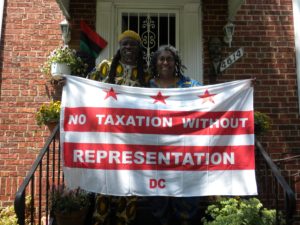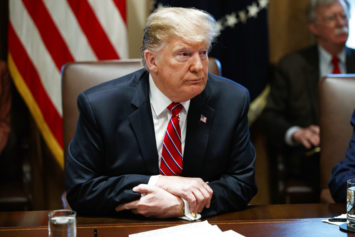Is now the time for statehood for the District of Columbia? As the 51st state of the Union, the nation’s capital would be known as New Columbia. It is not a new concept, but one that is receiving more attention these days.
Statehood bills have been introduced in Congress, most notably by Delegate Eleanor Holmes Norton. Further, D.C. Mayor Muriel Bowser wants to have the issue on the November ballot.
In the view of its residents, Washington is a colony. And it remains a political anomaly in the world, the only seat of government whose citizens do not have voting rights. The District has more people than Wyoming and Vermont, and its residents pay the highest taxes per capita. Yet, Congress can dictate the city’s spending, and the city has no representation in Congress. Even the U.N. Human Rights committee expressed its concern over the lack of voting rights for the city’s residents.
“The whole system we have in D.C. is a violation of every principle we stand for,” Shadow Senator Michael Brown (D-D.C.) told Atlanta Black Star. The second-term, non-voting Senator represents D.C. on Capitol Hill and lobbies lawmakers for statehood.
“In the District of Columbia, the motivations for the denial of statehood have in the past pretty much tracked a kind of course of policies — economic, political policies, social policies — that have tracked the emergence of Washington D.C. as a major city,” Samuel Jordan, the executive director of Health Care Now! told Atlanta Black Star. A protégé of D.C. Statehood Party founders Julius Hobson and Josephine Butler, Jordan was the last president of the D.C. Statehood Party.
President Barack Obama and both Democratic presidential candidates support the concept of D.C. statehood.
“In the case of our nation’s capital, we have an entire populace that is routinely denied a voice in its own democracy,” Hillary Clinton wrote in a recent commentary in the Washington Informer, in which she said that as president, she would be a “vocal champion” for statehood.
“Washington, D.C., is home to nearly 700,000 Americans – more than the entire population of several states. Washingtonians serve in the military, serve on juries and pay taxes just like everyone else. And yet they don’t even have a vote in Congress,” she said. “Hard as it is to believe, America is the only democracy on the planet that treats the residents of the capital this way.”
Clinton also noted that D.C., lacking voting power, is often left out of federal appropriations, with many of their decisions “at the mercy of right-wing ideologues in Congress” on issues such as gun laws, women’s health care and anti-drug abuse efforts.
In a 1993 Congressional debate on D.C. statehood, Bernie Sanders said that the District of Columbia, which is larger than his state of Vermont, should enjoy the same rights, with two senators, a member of Congress, a governor and state legislature.
“This debate is about one thing and the thing alone. That is whether the people of Washington, D.C., are entitled to be full citizens. To me the answer is obvious and I intend to vote yes for statehood for the District of Columbia,” Sanders said.

Rick & Michele in Benning Heights, DC (the51st.org)
“For most of U.S. history it’s been a kind of almost typical small-town capital in the colonial style — not a major city, but nevertheless it has emerged as an important city, internationally and nationally. And the movement with respect to statehood has been concerned with how people perceive this internationally and nationally,” Jordan said. “Our major barrier to statehood, at least in the strategies of pro-state activists over the years, has been to take a look at what people understand, what people know, what people know about the status of the district and what people know about the principal governance documents of the nation,” he added.
One of the primary arguments provided by D.C. statehood opponents is that the Constitution does not support it.
“As far as the Constitution goes, we have to understand these guys in 1789 were not particularly inclusive. They excluded African-Americans, they excluded Native Americans, they excluded women, they even excluded veterans who didn’t own property,” Brown said, arguing that the only group that has been excluded since 1801 are residents of the District of Columbia.
“Much of the opposition to statehood actually has been pretextual in my view. That is, many have cited the Constitution as the barrier, as the principal barrier to statehood in Washington D.C. and still do, even though the Constitution makes no discussion whatsoever about statehood in Washington D.C.” Jordan said, adding that all that is required for statehood is a majority vote in both houses of Congress and the president’s signature.
“The Constitution instead simply designates a 10-mile square as the seat of the federal government, and that 10-mile square was comprised of the land contributed by Maryland and the state of Virginia. The site itself was selected by George Washington, who wanted the seat of the federal government to be not more than a half-day’s carriage ride from his plantation at Mount Vernon. So the life of Washington D.C. has always been intertwined with slavery and his legacy,” Jordan noted. “And even in the period when Washington D.C. had no majority African-American population, its fate was still wrapped in the slavery politics, the politics of enslavement and the clash between the rival economies: a plantation economy and an industrializing, more commercial economy. The latter, of course, is said to have prevailed. However, the politics of that era have continued to dominate U.S. politics. Even though the South lost the war, the politics have continued, and that is true in his impact on the issue of statehood and self-determination for Washington D.C.,” he added.
“There’s a myth — of course people think the reason it can’t be a state is because it’s too small, it’s not like a normal state, it doesn’t have any rural areas, as if that’s a requirement for state,” Jordan said. “No such thing is required of the state. In fact, what we learned in the course of the 1993 debate in Congress about statehood, from Senator Ted Kennedy no less, is that Washington, D.C. statehood has been refused because of the “Three Too’s:” too Black, too urban, too Democratic,” Jordan shared.
Sen. Brown also believes the opposition to statehood is a partisan political issue.
“We have a bill in Congress. It has 131 co-sponsors, and it has 19 co-sponsors in the Senate. Unfortunately, everyone is a Democrat; not one Republican,” Brown said. “It is strictly a partisan battle at this point. They [Republicans] don’t care a whole lot if Eleanor Holmes Norton gets a vote, but they care about Democratic senators, because it is 2 percent of the entire Senate. They think D.C. will be Democratic in perpetuity. It is the argument they used for Alaska and Hawaii,” he added.
“Obviously it is the fact that we have no Republicans in the District of Columbia,” Brown offered. “We have never voted for a Republican for president. We are the most Democratic jurisdiction in the country,” he noted.
The confluence of race and politics in the statehood issue is evident when conservative Republican lawmakers compare the predominantly Black population of Washington to children, inferior colonial subjects who are unfit, unprepared and ill-equipped to govern themselves.
“Well, when my kids were young and teenagers they often want budget autonomy, too,” Rep. John Mica (R-Fla.) said, according to The Washington Post.
When asked if he thinks D.C. leaders are children, he responded: “No, but they have matured and we just don’t want regression.”
“The political landscape has to be friendly, and unfortunately we’re entangled in politics. Republicans equate statehood with three more Democratic seats in Congress,” Kimberly Perry, Executive Director of DCVote — an educational and advocacy organization dedicated to securing full voting representation in Congress for District residents — told Atlanta Black Star.
Perry referenced a statement by Ohio Governor and former Republican presidential candidate John Kasich to The Washington Post in April, in which he said that as long as Republicans are in the majority, there would be no statehood for the District of Columbia.
“What it really gets down to, if you want to be honest, is because they know that’s just more votes in the Democratic Party,” Kasich said.
Further, for a number of people working on statehood, there is an international human rights dimension to the issue.
“Internationally, we’ve also sought to educate about the status of Washington D.C. and the nation that claims to be the beacon of democracy throughout the globe. But it doesn’t permit the citizens of its own federal district, its own capital district to full rights as all other citizens,” Jordan noted. “At one point, the United States shared that distinction only with Australia and apartheid South Africa. Australia has granted full civil rights to its residents of Canberra. And South Africa, with the passage of its constitution, has also granted democratic rights to the residents of its capital area in Pretoria. But the United States is the only one left. We share this with no one,” he added.
“When your civil rights record lags behind South Africa, that says something,” Brown said.
The shadow senator told Atlanta Black Star that the District of Columbia is a member of the Unrepresented Nations and Peoples Organization. UNPO is an international organization consisting of those who have been inadequately represented in the international arena, including “indigenous peoples, minorities, and unrecognized or occupied territories who have joined together to protect and promote their human and cultural rights, to preserve their environments, and to find nonviolent solutions to conflicts which affect them.”
Therefore, D.C. residents have resorted to the international community to secure rights they are denied at home.
“We have a vote in a body that goes before the U.N. and the European Union, but not the U.S. government,” Brown said of D.C. membership in UNPO. “We’re the only organization in North America. This should be an embarrassment to the U.S. that we march around the world about democracy and don’t even have it in our own country,” he added.
“Don’t lecture to us about human rights when you don’t let the people of your own country vote,” the senator said, quoting a statement a representative from China once made to an American colleague.
Meanwhile, Jordan has explored the role of demographics and the ethnic composition of territories before they were admitted to the Union.
“Preliminary research suggests there have been no territories with non-white majorities admitted to the Union expect one state, and that’s Hawaii. And there are territories that may have had nonwhite majorities, but they were native people, and therefore never counted and never regarded as worthy of being considered with the matter of the appropriation of their own land,” he stated.
New Mexico’s first petition for statehood was denied in 1876 because, as was said at that time, “New Mexico has too many Mexicans, too many Indians, too many ‘greasers,’ ” Jordan noted.
Further, when Hawaii sought admission to the Union, then-Senator Lyndon B. Johnson, the dean of the Dixiecrats in Congress, made sure that Alaska — with its majority-white population when discounting Native Americans — was admitted first. The majority-Asian and Pacific Islander population of Hawaii was vilified as being too Asian and perceived as communist. According to Jordan, it was a tactical decision on Johnson’s part to seek statehood for Alaska first because “LBJ was concerned that had Hawaii become a state … it would send a delegation to Congress that was opposed to segregation. LBJ was a leader of the Dixiecrats, the force behind codified segregation in the country. They lost the war but won the peace. And this concern meant that had Hawaii become the 49th state, for example, it would be a tiebreaker. If there were measures before Congress where they were split evenly on matters of segregation — national race policy — Hawaii would be the tie breaker.”

“The sense was in that period in the late ’50s and ’60s — when racial tensions were extremely high, the Civil Rights Movement was changing the political landscape in the nation through the resistance of African-Americans — this period brought scrutiny to Washington D.C. and its demands for greater self-governance,” Jordan said. “Because it would mean that the capital of the nation would have a Black majority, and for some reason that’s not quite what the leaders of the country — influenced by the South and the fear of enslavement and the policies derived from it — wanted for the nation’s image.”
The nation’s capital is currently undergoing a transformation, as gentrification brings more affluent and white residents into the city, which, according to Jordan, has the largest gap between rich and poor in the nation. While D.C. once had a Black population upwards of 70 percent several decades ago, Blacks now have a plurality of 49 percent according to the Census, with whites at 43.6 percent, Latinos at 10.4 percent and Asians at 4 percent. According to Truth-Out.org, in 2011 the first city in the nation with a Black majority dropped below 50 percent for the first time in half a century, losing 40,000 Black residents due to exorbitant rents fueled by an influx of white professionals. As Mint Press News reported, D.C. is the nation’s capital of gentrification, as Black families are displaced to make way for massive redevelopment projects.
Jordan says that the movement for statehood is diversifying due to changing demographics. While the calls for self-determination in D.C. was once fueled by poor and working-class Black people from the time of the insurrection following the assassination of Dr. Martin Luther King Jr., there is renewed interest and a “robust discussion” on statehood among its new residents.
“Largely, white Americans have already experienced democratic relationships with the leadership of the nation. They’re used to going to their senators their representatives and getting problems solved,” Jordan said. “They don’t find Washington, D.C., without access to senatorial or representative authority, the place they want to live to deal with issues of their own quality of life, and their own political direction and leadership,” he argued.
“Only through living in a state can a citizen be guaranteed full representation,” Perry declared. “People want Congress out of our budget and out of our lives, and want to be able to choose” for themselves, she added.
“We’re not asking for special treatment — we’re asking for equal treatment. We’re not inside-the-Beltway lobbyists. We’re everyday people raising families, worrying about our kids’ education, jobs and transportation, and want to be treated like everybody else,” Perry said, adding that “D.C. residents do not have unique access or undue influence,” but rather they “do not have a representative in the U.S. Congress where important decisions are made about their lives.”
Perry also noted that while people outside of Washington may trivialize it, “They have full representation in Congress and lawmakers who must listen to them.”
It makes a big difference, she said, when citizens call their lawmakers to demand a law giving equality to D.C.
“People are starting to learn more about D.C., and the more they learn, the more things will change,” she added.
“Our biggest problem is getting the word out, because 80 percent of people think we have the same rights that they do,” Sen. Brown said, urging people to call their legislator and support the statehood bill before Congress, or go to www.statehoodnow.org and sign their petition.
When asked about the current prospects for D.C. being admitted as the 51st state, Brown was reflective.
“That’s a tough question. I don’t know exactly how you calculate that. I wish I could talk to Rosa Parks and ask her — after she refused to give her seat up — if she knew it would cause a firestorm. I’m not sure when people will coalesce,” he added.
“We take the approach that Dr. King took. He actually supported home rule in the District of Columbia. King said that injustice anywhere is a threat to justice everywhere. If you allow injustice to exist, it comes back around,” Brown said.



